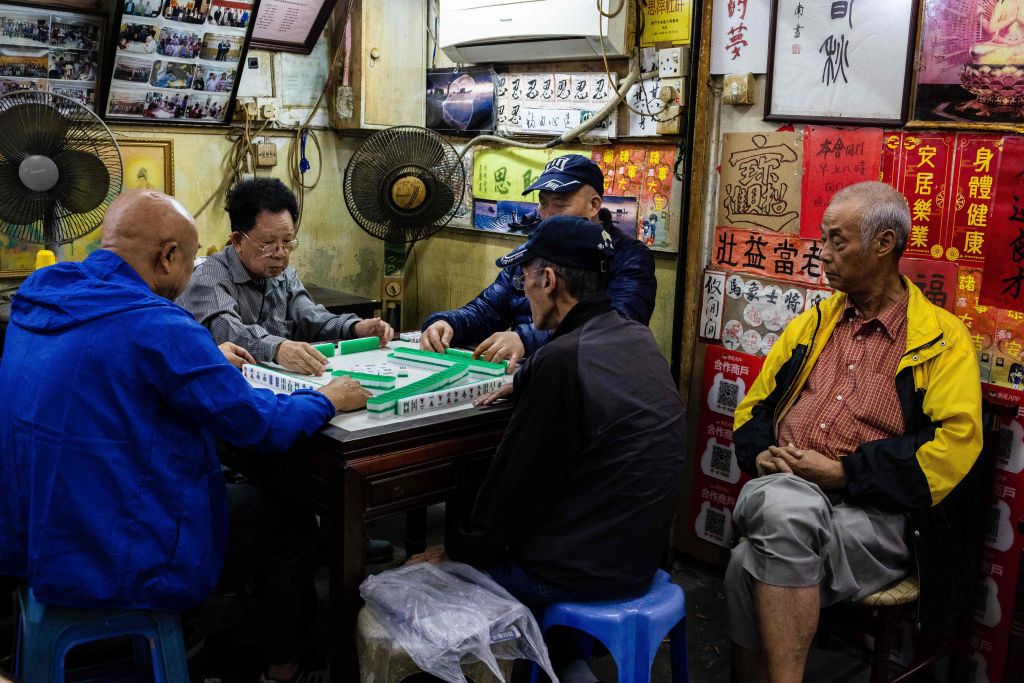Mao Zedong once said that the game of mahjong should not be underestimated, because:
‘If you know how to play it, you’ll have a better understanding of the relationship between chance and necessity. There’s philosophy in mahjong. It’s also dialectical…even if you have the worst hand, as long as you are strategic and methodical, the inferior will become superior; weakness will become strength.’
He even claimed the tile-based game was one of China’s three ‘great contributions’ to the world. Ironically, mahjong was outlawed under his rule. The early communists viewed it as an unnecessary distraction for the masses, and disliked its links to gambling and capitalism. It was not until 1985 the ban was lifted. Today the game is as popular as ever.
Walk around any street corner or a park in China and you are likely to hear the sound of tiles clacking and middle-aged men and women hunched over a rectangular board. With sweat dripping from their faces and with nervous puffs at a cigarette, the players hustle the tiles in marathon sessions that can last for hours on end. Crowds can quickly gather if the battle gets heated or if a showdown looms. Some locals complain about being woken up by the shuffling of the heavy tiles.
It is said that friendships, relationships, and even business partnerships are formed — or broken — around a mahjong table. It is not difficult to see why. The game has for years brought communities together, cutting across gender, class, geography and demographics — although younger people now tend to play it on their smartphones. For the aficionados, there are numerous smoke-filled fluorescent-lit mahjong dens dotted around Chinese cities, where gaggles of elderly people can be seen strolling in and out of underground bunkers. Despite their nondescript façades and small entrances, these parlors often open into cavernous basements that can accommodate around 100 mahjong tables.
This intensely sociable game is, however, causing problems in the era of social distancing. In China’s all-out war against the coronavirus, mahjong is becoming a nuisance for the authorities.
One recent case highlights just how China’s ‘national game’ is becoming a problem for the country’s zero COVID approach. On July 21, a 64-year-old woman traveled to the eastern city of Yangzhou from her hometown in Nanjing to meet her sister. She could not resist visiting mahjong parlors in the city. Almost a week later, she started coughing and developed a fever, and was diagnosed with COVID-19. On August 3, city officials announced that there were 94 active cases, with 64 percent linked to mahjong parlors — in what is the biggest single outbreak in China’s ongoing wave of infections. Local officials in Jiangsu province, where Yangzhou is located, have since shut down more than 45,000 of these parlors. Beijing, and four other hard-hit provinces have also taken similar measures. Cash prizes have been announced for information on people who played at the virus-hit parlors. But such is the allure of the one-inch tiles that whenever parlors reopen, hordes of people come flooding back. The poorly-ventilated and crowded social spaces are perfect super-spreader sites.
The authorities clearly understand that the enduring popularity of mahjong could complicate their COVID-19 success story and they are now trying to goad the public into shunning the game. ‘Those who gather together are shameless; those who play mahjong are daredevils,’ reads a banner plastered across Chinese cities. ‘Report mahjong houses that your parents go to, just like how they reported illegal internet cafes years ago,’ says another.
There have also been cases of more forceful measures used, reflecting the authorities’ paranoia. In one incident captured on video in Hubei province, a gang led by a camouflaged man wearing a red armband roughed up villagers at a mahjong parlor, before pulling a playing table outside and smashing it to pieces. This attempt to intimidate the villagers did not go entirely to plan. Afterwards a local official was forced to visit the village twice to apologize.
In another video that emerged early last year a drone filmed some villagers playing mahjong. ‘Playing mahjong outside in banned during the epidemic. You have been spotted. Stop playing and leave the site as soon as possible,’ an official ordered through the drone megaphone. ‘Don’t look at the drone, child; ask your father to leave immediately,’ the official told a boy looking inquisitively up at the camera.
Even prior to the pandemic, mahjong had been in the authorities’ crosshairs. Police in Yushan country announced a ban on all mahjong parlors in 2019 to curb illegal gambling and to ‘purify social conduct’. But such was the uproar against the move that the authorities had to back-track — a rare incident in China — and clarify that only unlicensed parlors would be shut. In 2014, state media urged Chinese officials to ‘resolutely stop’ playing mahjong, a favored way to while away the hours for many cadres. Chinese universities have also discouraged students from playing the game lest they become addicted to gambling or crime.
For Xi Jinping, who exhorts the public to ‘constantly strive for the Chinese dream of the great rejuvenation of the Chinese nation,’ the board game appears to be an irritant. He has championed traditional Chinese medicine and calligraphy as cultural exports but has been reluctant to embrace China’s national pastime.
China’s rulers have often had an uneasy relationship with the game. Madiao, mahjong’s predecessor, was seen as a key factor behind the Ming dynasty’s collapse and a sign of societal decline. The noisy game also provides the perfect setting for discreet conversations about politics — a problem for authorities who are always fearful of unfiltered information seeping into society. The leftist intellectual Wu Han used mahjong parties in 1949 to host political discussions while he was under surveillance by the country’s security forces.
But while China has recently reined in seemingly benign recreational activities such as video games and karaoke, a crackdown on the much-beloved mahjong might be too difficult, even for the mighty Xi Jinping. Mahjong may be causing a spike in coronavirus infections, but the Chinese authorities seem to be fighting a losing battle in stamping it out.
This article was originally published on The Spectator’s UK website.


















